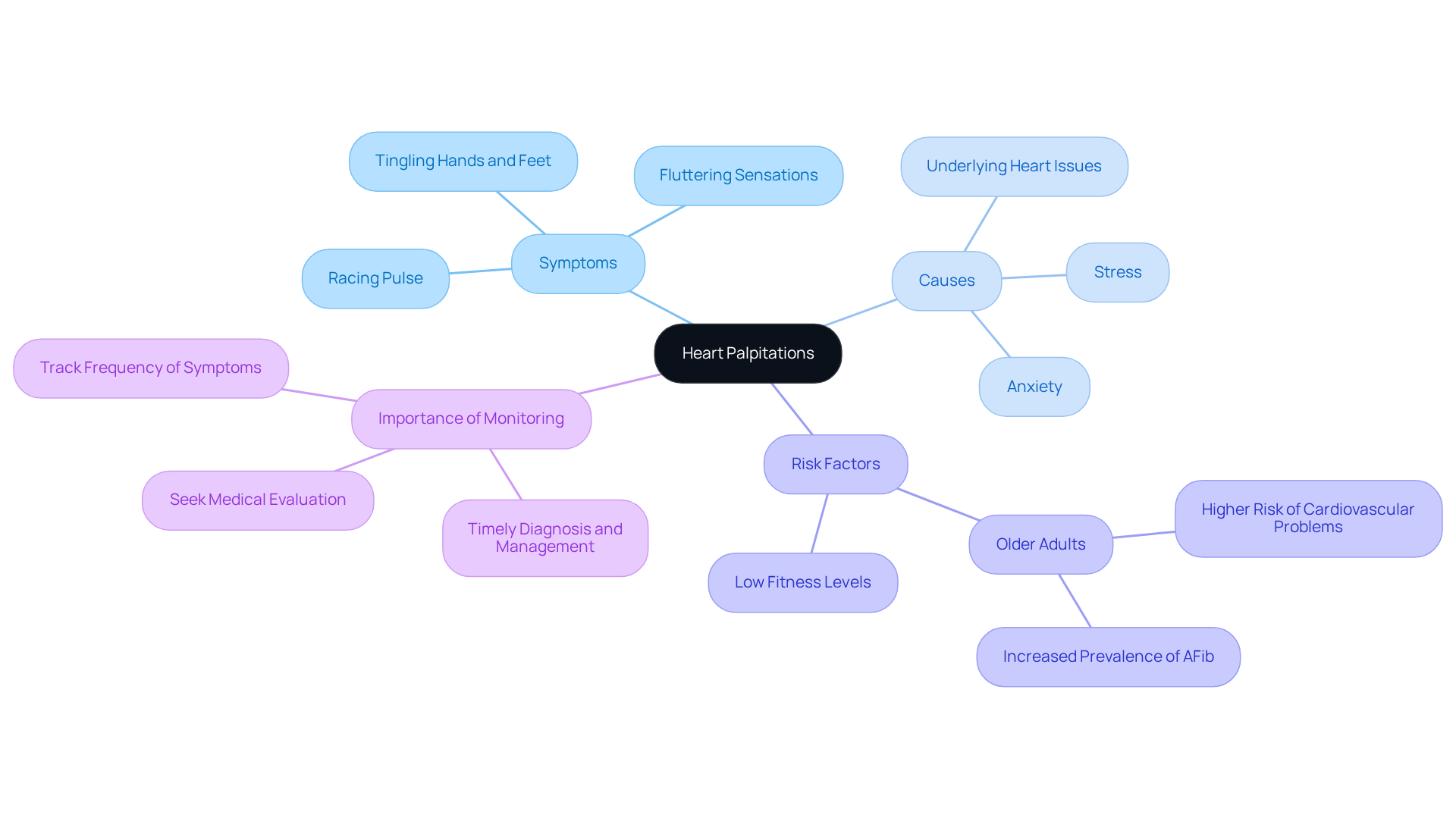


Experiencing heart palpitations along with tingling in the hands and feet can be quite unsettling, especially for older adults who may already be facing increased cardiovascular risks. These sensations often act as important signals from your body, urging you to pay closer attention to your health. But how do you know when these symptoms are just a minor concern or a sign of something more serious?
Understanding the underlying causes of these sensations is crucial. It’s natural to feel anxious about what they might mean for your heart health. In addition to this, recognizing that you’re not alone in this experience can provide some comfort. Many people share similar concerns, and it’s okay to seek help and clarity.
If you’re feeling uncertain, it’s important to reach out to a healthcare professional who can guide you through these feelings and provide the support you need. Remember, taking action is a sign of strength, and understanding your body is a vital step towards better health. You deserve to feel secure and informed about your well-being.
Experiencing sensations such as heart palpitations, tingling hands and feet, along with your pulse racing, pounding, or fluttering can be concerning. These experiences often stem from various factors, such as stress, anxiety, or even underlying heart issues, including symptoms like heart palpitations and tingling hands and feet. While many heart rhythms are harmless, it’s important to pay attention, especially for older adults who may have existing cardiovascular conditions. Did you know that heart sensations are notably more common in individuals over 60? They can sometimes signal serious issues like arrhythmias.
Research shows that seniors are at a higher risk for cardiovascular problems, which can amplify the effects of irregular heartbeats. Keeping track of how often these sensations occur, along with any related signs, is crucial. It might indicate that you need further medical evaluation. Cardiologists emphasize that irregular heartbeats, particularly when experienced alongside heart palpitations and tingling hands and feet at rest, should not be ignored. They could be linked to significant heart health concerns.
Understanding these signs is vital for timely diagnosis and management. This knowledge can ultimately lead to better health outcomes for older adults. Remember, you’re not alone in this journey. If you’re experiencing these sensations, reaching out for support is a strong and positive step towards taking care of your heart.

Heart irregularities can feel alarming, manifesting as a racing heartbeat, fluttering sensations, or skipped beats. When these symptoms are present with heart palpitations, tingling hands and feet, it’s understandable to worry about a deeper health issue. Tingling, known medically as paresthesia, can arise from various factors like nerve compression, poor circulation, or even anxiety. For older adults, experiencing tingling in the extremities is particularly significant, often linked to conditions such as peripheral neuropathy, which may result from diabetes, vitamin deficiencies, or other health concerns.
Did you know that around 19 million American adults struggle with anxiety disorders? This can amplify feelings of rapid heartbeat and tingling, making it even more challenging to cope. Sometimes, these signs might be mistaken for something more serious, like a heart condition, which is why a thorough assessment is crucial. For instance, individuals with atrial fibrillation (AFib) often report dizziness and weakness alongside irregular heartbeats, highlighting the importance of understanding the full spectrum of symptoms.
While occasional heart palpitations, tingling hands and feet can be harmless, it’s essential to take persistent or severe occurrences seriously. If you’re experiencing these symptoms, please consider reaching out to a healthcare professional. They can provide a comprehensive assessment to rule out serious issues and address any underlying causes effectively. Remember, maintaining a healthy lifestyle - regular exercise and stress management - can be vital in easing these symptoms and improving your overall cardiovascular health.
You’re not alone in this journey. Seeking help is a strong and positive step towards better health.

Irregular beats can be concerning, especially for older adults. Factors like stress, caffeine intake, certain medications, and existing cardiovascular issues can contribute to these irregularities. Additionally, peripheral neuropathy - a condition that affects the nerves - can lead to tingling sensations in the hands and feet. This nerve damage may arise from diabetes, vitamin deficiencies, or other health issues, impacting circulation and causing discomfort.
Furthermore, anxiety can intensify both heart irregularities and heart palpitations, tingling hands and feet, creating a challenging cycle that can be particularly tough for seniors facing various health challenges. Have you noticed how anxiety can sometimes make physical symptoms feel even worse? Studies indicate that anxiety disorders are quite common among older individuals, often exacerbating physical effects like heart racing.
Cardiologists stress the importance of addressing both mental and physical health to effectively manage these symptoms. Understanding these connections is crucial for developing appropriate treatment strategies. Remember, you’re not alone in this journey. Seeking help and support can significantly improve your overall well-being. It’s essential to take care of both your mind and body, and there are resources available to help you navigate these challenges.

Recognizing when to seek medical care for heart irregularities is vital, especially for our senior loved ones. Symptoms like chest pain, shortness of breath, dizziness, or prolonged heart palpitations, tingling hands, and feet should never be overlooked. These signs could indicate serious conditions such as arrhythmias or cardiovascular events. For instance, older patients experiencing irregular heartbeats alongside dizziness and chest discomfort have faced serious consequences, including hospitalizations for heart-related issues.
Cardiologists emphasize that these symptoms warrant immediate attention. Dr. Farid notes that if heart sensations occur frequently or last for an extended period, particularly when accompanied by fatigue or dizziness, it’s essential to consult a healthcare professional. It’s important to remember that older adults are at a heightened risk for conditions associated with heart palpitations, tingling hands, and feet, such as atrial fibrillation, which can lead to complications like stroke if not treated promptly.
Emergency signs, including sudden weakness or confusion, should also be taken seriously. Regular check-ups and open communication with healthcare providers can significantly improve the management of these symptoms. By ensuring timely intervention, we can foster better health outcomes. Remember, you’re not alone in this journey; reaching out for support is a strong and positive step towards maintaining your health.

Experiencing heart palpitations along with tingling sensations in your hands and feet can be quite alarming, especially for older adults. It’s important to understand these symptoms, as they often signal underlying health issues that may need timely attention. By recognizing the connection between these sensations and potential cardiovascular problems, you can take meaningful steps to manage your health.
Have you noticed how often these symptoms occur? Monitoring the frequency and intensity of palpitations and tingling is crucial. Factors like anxiety, stress, and existing health conditions can make these symptoms worse. If you find yourself experiencing persistent or severe occurrences, please don’t hesitate to seek medical evaluation. Remember, it’s essential not to dismiss these signs, particularly if you’re an older adult who might be at a higher risk for serious complications.
Ultimately, raising awareness about heart palpitations and tingling sensations can lead to better health outcomes. Prioritizing your well-being is vital, and maintaining open communication with healthcare professionals is key. If you ever feel uncertain or anxious about your symptoms, reaching out for support can make a world of difference. Taking action in response to these symptoms not only enhances your personal health but also fosters a greater understanding of cardiovascular health within our community. You are not alone in this journey.
What are heart palpitations?
Heart palpitations are sensations of a racing, pounding, or fluttering heartbeat that can be concerning. They may occur alongside other symptoms like tingling hands and feet.
What causes heart palpitations?
Heart palpitations can stem from various factors, including stress, anxiety, or underlying heart issues. They are notably more common in individuals over 60 years old.
Why are heart palpitations significant for older adults?
For older adults, heart palpitations can signal serious issues such as arrhythmias or other cardiovascular problems, especially if they occur frequently or alongside other symptoms.
What should I do if I experience heart palpitations?
If you experience heart palpitations, especially at rest, it’s important to keep track of how often they occur and any related signs. Consulting a healthcare professional for further evaluation is crucial.
What should I be aware of regarding irregular heartbeats?
Irregular heartbeats, particularly when accompanied by heart palpitations and tingling sensations, should not be ignored as they could be linked to significant heart health concerns.
How can understanding heart palpitations lead to better health outcomes?
Understanding the signs and symptoms of heart palpitations is vital for timely diagnosis and management, which can ultimately lead to better health outcomes for older adults.
Is it normal to feel alone when experiencing heart palpitations?
No, many individuals experience these sensations, and reaching out for support is a positive step towards taking care of your heart health.